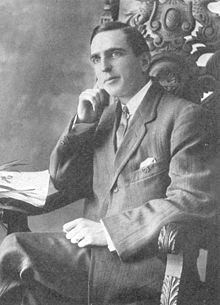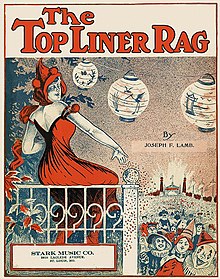Joseph Lamb (composer)
- For Sir Joseph Lamb, 1930s Staffordshire politician, see Joseph Lamb (politician)



Joseph Francis Lamb (December 6, 1887 – September 3, 1960) was a noted American composer of ragtime music. Lamb, of Irish descent, was the only non-African American of the "Big Three" composers of classical ragtime, the other two being Scott Joplin and James Scott.
Lamb was born in Montclair, New Jersey. The youngest of four children, he taught himself to play the piano, and was very taken with the early ragtime publications of Scott Joplin. He dropped out of St. Jerome's College in 1904 to work for a dry goods company. In 1907 Lamb was purchasing the latest Joplin and James Scott sheet music in the New York City offices of John Stark & Son when he met his idol Joplin. Joplin was favorably impressed with Lamb's compositions, and recommended him to classical ragtime publisher John Stark. Stark published Lamb's music for the next decade, starting with "Sensation".
Lamb rags published during his lifetime included:
- "Sensation" (1908)
- "Ethiopia Rag" (1909)
- "Excelsior Rag" (1909)
- "Champagne Rag" (1910)
- "American Beauty Rag" (1913)
- "Contentment Rag" (1915)
- "Ragtime Nightingale" (1915)
- "Cleopatra Rag" (1915)
- "Reindeer" (1915)
- "The Top Liner Rag" (1916)
- "Patricia Rag" (1916)
- "Bohemia Rag" (1919)
In 1911, Lamb married Henrietta Schultz and moved to Brooklyn, New York. He worked as an arranger for the J. Fred Helf Music Publishing Company and later, starting in April 1914, as an accountant for L. F. Dommerich & Company.
Henrietta died of influenza in 1920, about the same time that popular music interest shifted from ragtime to jazz. Lamb stopped publishing his music, playing and composing only as a hobby. "Bohemia Rag" was the last Lamb rag published before his death in 1960. That same year, his album, Joseph Lamb: A Study in Classic Ragtime, was released by Folkways Records.[1]
With the revival of interest in ragtime in the 1950s, Lamb shared his memories of Joplin and other early ragtime figures with music historians. (Many were surprised to find that not only was he still living, but that he was white.) He also composed some new rags, brought out some of his old compositions that had never been published, and made some recordings.
Lamb died in Brooklyn of a heart attack at age 72. Rags that remained unpublished at the time of his death included:
- "Alabama Rag"
- "Alaskan Rag"
- "Arctic Sunset"
- "Bee Hive"
- "Bird-Brain Rag"
- "Blue Grass Rag"
- "Chasin' the Chippies"
- "Cottontail Rag"
- "Firefly Rag"
- "Good and Plenty Rag"
- "Greased Lightning"
- "Hot Cinders"
- "Jersey Rag"
- "Joe Lamb's Old Rag"
- "The Old Home Rag"
- "Ragged Rapids Rag"
- "Ragtime Bobolink"
- "Ragtime Special"
- "Rapid Transit Rag"
- "Thoroughbred Rag"
- "Toad Stool Rag"
- "Walper House Rag"
References
- Jasen, David A. (1978). Rags and Ragtime: A Musical History. New York, NY: Dover Publications, Inc. pp. 122–133. ISBN 0-486-25922-6.
{{cite book}}: Unknown parameter|coauthors=ignored (|author=suggested) (help)
External links
- "Perfessor" Bill Edwards plays many Lamb rags, with stories.
- Article: "Joseph Lamb: The Humble Ragtime 'Sensation'" by Ted Tjaden
- Lamb and his compositions on grainger.de
- Photo of Joseph Lamb
- An episode of A Prairie Home Companion featuring the music of Lamb, with a biography as told by Garrison Keillor
- Joseph Lamb at Find a Grave
- Free scores by Joseph Lamb (composer) at the International Music Score Library Project (IMSLP)
